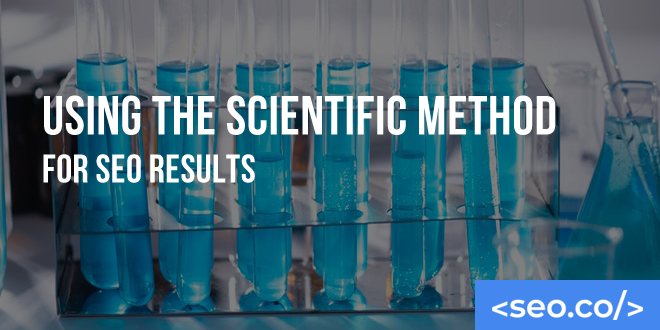The scientific method is, appropriately enough, the fundamental philosophy and approach that defines how working scientists approach problems and new discoveries about the world around us. It’s the series of steps that led to the emergence of theories as complex and as marvelous as relativity, evolution, and the big bang model of the universe.
But the scientific method, while most often applied to realms like physics and chemistry, can actually be applied to any problem in the modern world. Because it’s the most objective, logical framework we have, it tends to get the best results. Apply that method to your SEO strategy, and you’re almost guaranteed to start seeing better, more measurable results.
Table of Contents
Step One: Ask a Question

The first step is the easiest, as the question in SEO is usually “how can I rank higher?” However, in the SEO community as in the scientific community, the more specific your question is, the more meaningful conclusions you’ll be able to draw. For example, asking “why do things fall?” is much less specific than “why do two objects fall at the same velocity when outside resistance is removed?” Both have scientific answers, but only through multiple rounds of more specific questions are you able to form the broader, more significant conclusions.
Start out with a question like “will doubling my number of written articles per week increase my rank?” or “will posting more links on local news sources increase my local relevance?”
Step Two: Do the Research

Don’t just jump in blindly. Do your due diligence first and start researching the topic. You can find a lot of answers here at SEO.co, but there are admittedly a great deal of SEO authorities out there. Eventually, you should find some specific advice related to your question, or if you’re really lucky, a case study. Review multiple sources of information before completing your round of SEO keyword research, and if you’ve experimented with a similar strategy in the past, be sure to look to your own experience for guidance.
Eventually, you should have a short list of information that gives you an educated guess on how your question can be answered, which brings us to the next step of the process.
Step Three: Formulate a Hypothesis

Now, you’ll need to form a hypothesis. Keep in mind that a hypothesis is not a conclusion; the conclusion can only come after the next steps of the process. Right now, all you have is a guess, even if it is an educated one, because it isn’t supported by any data you’ve been able to uncover.
That being said, your hypothesis should directly answer your question. Again, you’ll want to be as specific as possible, because the specificity of your question will help you construct an experiment (in the next step) that leads you to more thorough results. As an example, in the first step we asked “will doubling my number of written articles per week increase my rank?” Assuming you’ve done research that suggests the answer to this question is yes, you can come up with a hypothesis like “Writing two articles per week instead of one will result in a sharp increase in average keyword ranks and organic traffic within two months’ time. The increase over these two months’ time will be greater than the increase from two months ago until now.”
Step Four: Use Experiments to Test the Hypothesis

You have your hypothesis, and now you have to test it. Even if the research suggests that your findings will match your hypothesis, you still have to test it in a live environment for you to be certain of the results.
In a scientific setting, you would usually need a “control group” to serve as the basis for comparison. In some SEO cases, such as testing landing page copy, you can do this with the help of an AB test. However, in our hypothesis, and in many SEO hypotheses, you’ll find establishing a control group impossible (unless you host two different versions of your site, which would be far more complicated than it’s worth).
Instead, make do with what you have. Your previous two months of data can serve as the control group. Run the experiment, being careful to avoid any other changes (extra variables) that might interfere with your conclusion.
Step Five: Form a Conclusion

Once all your data is in, you’ll be able to look back at your original hypothesis and determine whether it is true or false. If it appears to be true, then congratulations—you now have a bona fide strategy you can permanently integrate into your long-term approach to SEO. If it appears to be false, you’ll either have to modify the experiment and try again, or rest confident that the strategy is not an effective one.
(Alternate Step Six): From a New Hypothesis
If you suspect that something went wrong during the process, that your question wasn’t specific enough, or that there’s a related hypothesis that may still be true, you can circle back to step three. Here, you’ll form a new hypothesis, run the appropriate experiments, and hopefully find equally enlightening results.
With these steps defining your approach as a search marketer, you should have no problem finding and keeping the tactics that best suit your quest for higher ranks. Objectively and iteratively, you will eliminate strategies that aren’t worth your effort and acquire strategies that only give you a benefit.
- How to Tell if an SEO Agency Is Trustworthy [in 5 Steps] - April 7, 2025
- Why Isn’t My Website Ranking on Google? [9 Reasons + Fixes] - April 2, 2025
- Why Your Google Rankings Dropped & How to Fix It - March 29, 2025



